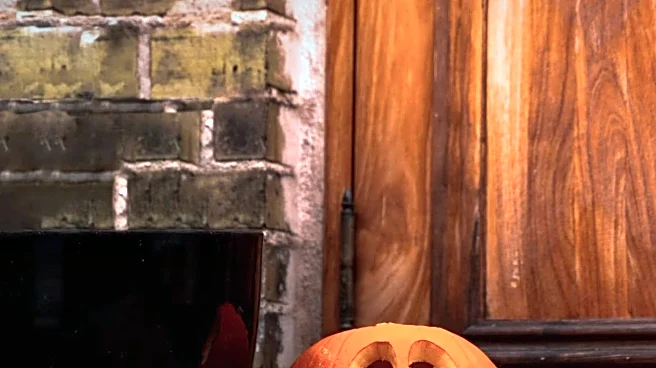What is the story about?
What's Happening?
Home Depot has released its popular 12-foot skeleton decoration, known as the 'Skelly,' for the Halloween season. These giant skeletons, featuring posable arms and LCD eyes, have become a staple in Halloween decorations since their introduction in 2020. Priced at $299, the Skelly is available at Home Depot stores, although stock is limited. The skeleton weighs over 59 pounds and requires an electrical outlet for its eyes to light up. The retailer offers a 90-day return policy for this product. The early availability of these decorations has sparked excitement among Halloween enthusiasts, marking the unofficial start of the spooky season.
Why It's Important?
The popularity of the 12-foot skeleton reflects a growing trend in elaborate Halloween decorations, which has become a significant market for retailers like Home Depot. This trend indicates a shift in consumer behavior, with more individuals investing in large-scale decorations to enhance their holiday experience. The demand for such items can impact retail sales positively, especially as consumers seek unique and eye-catching decorations. Additionally, the early release of these products suggests a longer Halloween season, potentially influencing other holiday-related retail strategies and consumer spending patterns.
What's Next?
As Halloween approaches, retailers may continue to expand their offerings of large-scale decorations to meet consumer demand. Home Depot and other stores might increase stock or introduce new designs to capitalize on the popularity of such items. Consumers can expect to see more neighborhoods adorned with these giant skeletons, contributing to a festive atmosphere. Retailers might also explore collaborations with designers to create exclusive or themed decorations, further driving interest and sales.
Beyond the Headlines
The trend towards larger and more elaborate Halloween decorations raises questions about environmental impact and sustainability. The production and disposal of such items could contribute to waste and resource consumption. Retailers and consumers may need to consider eco-friendly alternatives or recycling options to mitigate these effects. Additionally, the cultural significance of Halloween as a major holiday in the U.S. continues to grow, influencing social norms and community engagement.
















